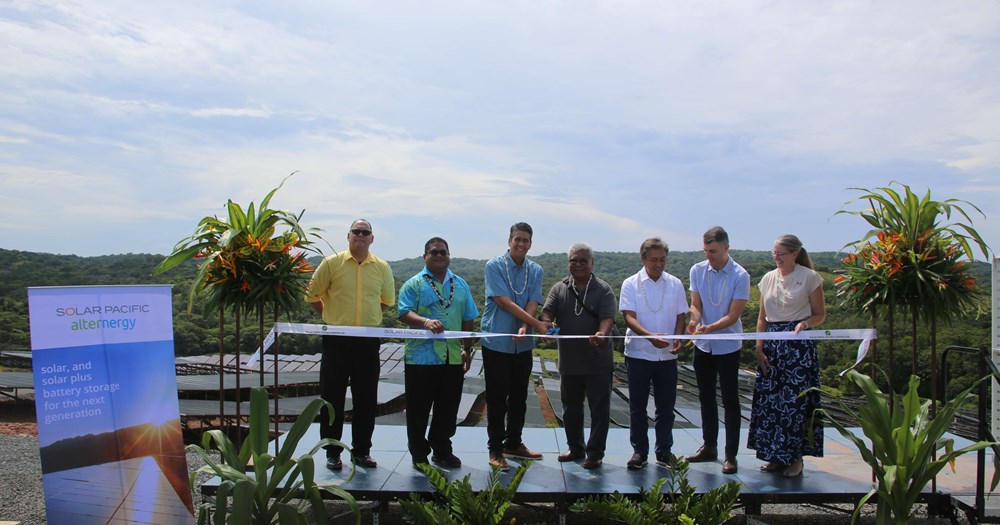DNV, the independent energy expert and assurance provider is pleased to have supported a landmark solar and storage project in the Republic of Palau in the Western Pacific.
Philippines-based power producer Solar Pacific Energy Corporation (SPEC), the solar developer of listed Alternergy Holdings Corporation, appointed DNV as Owner’s Engineer for the 15.3 MWp solar power and associated 13.2 MWh battery energy storage system (BESS) in Ngatpang state on Babeldoab, the largest island in the Palau archipelago. The USD 29 million project, jointly owned by SPEC and its listed parent Alternergy, will meet more than 20% of Palau’s energy needs. SPEC was awarded a long-term power supply agreement by the Palau Public Utilities Corporation (PPUC) to feed power to the central grid in Badelboab. The power plant was inaugurated last June 2.
DNV’s work scope for the solar + BESS hybrid system, SPEC’s first venture into overseas markets, spanned four phases across the design, pre-construction, construction, and project completion stages. DNV assessed if the design would meet two main purposes: grid smoothing and energy generation. It advised on project scheduling and progress tracking, and checked the engineering, procurement and construction (EPC) contract on SPEC’s behalf.
“Solar Pacific is grateful to DNV for its excellent technical and project management support throughout the pre-construction and implementation stages of this exciting project. DNV provided valuable expertise to ensure the delivery of a rather complex project that involved a PV and battery storage hybrid solution on a challenging project site located in a remote location. We look forward to expanding our working relationship with DNV throughout the Asia Pacific region,” said Mike Lichtenfeld, Chief Executive Officer, SPEC.
“Alternergy is delighted to conclude another successful renewable project with DNV,” added Gerry Magbanua, president of Alternergy, “since 2014, we have collaborated with DNV in developing our pioneering wind and solar projects in the Philippines”.
Project construction management was conducted remotely from DNV’s Singapore office, with DNV’s partner providing onsite construction personnel supervised and managed by DNV and owner’s site representatives (OSRs) for both the civil and electrical engineering aspects. The OSRs monitored construction and with input from DNV specialist engineers, delivered several monitoring, inspection, verification, witnessing and testing activities during construction, commissioning, testing and energization of the system.
DNV inspections post-commissioning ensured that non-conformance with contract specifications was sufficiently rectified before certifying the project as ready for handover and issuing the Final Completion Certification.
According to DNV’s latest Energy Transition Outlook report, Southeast Asia will see solar PV and solar coupled with storage play a significant role in the region’s electricity generation share, rising sharply from the late 2030s to generating 74% of the electricity by 2050.
“We are delighted to have provided value to SPEC, complemented the developers’ plan, minimized the customer’s risks and helped to ensure the project’s success,” said Brice Le Gallo, Vice President and Regional Director APAC, Energy Systems at DNV. “This largest solar + BESS project in the Western Pacific illustrates how we leverage our expertise and experience in handling utility-scale solar and BESS projects to provide best-quality work.”
He continued: “With a proven project track record in Australia, China, India, Japan, Malaysia, the Philippines, Singapore and Thailand, DNV’s expert solar team in Asia Pacific has extensive knowledge on local challenges faced by developers. Coupling these with global best practices from our offices worldwide, I believe we have exceptional global experience in utility-scale solar power plants and BESS systems.”
Michael Niu, Project Manager at Energy Systems at DNV said “With a project in a location as unique as the Republic of Palau, the jurisdiction itself is challenging as the project engineering codes and local requirements are very specific. As such, it was critical that a multi-disciplinary engineering team well-versed in international codes, standards and best practices was assembled.”
